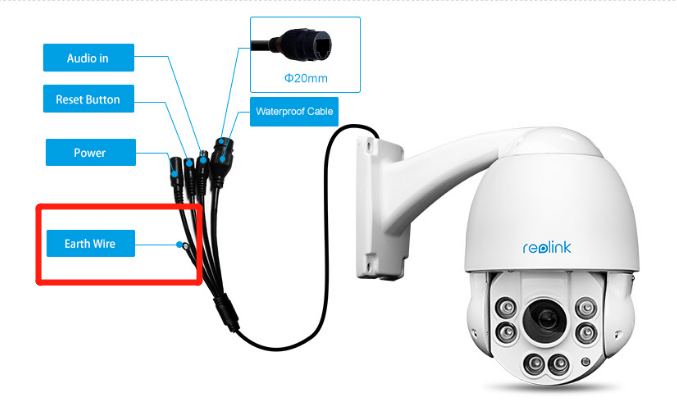For cameras installed outdoors, you must want them to be in an electrically safe condition, especially when there is thunder and lightning. Read the article to learn how to install earth/ground wire for RLC-423.
Note: The earth/ground wire is for lightning or thundering protection.
When installing a security camera system outside your home, you should use a proper grounding system and avoid mounting your camera to a metal structure. These lightning surge protection tips will help minimize the risk of a strike.

- If your CCTV outdoor security camera is mounted on a building, then it should be grounded to that building's structural steel, as close as possible to the camera.
You can use 1 ½-inch copper strap for the grounding. This will reduce the risk of a power surge traveling down the coax to the NVR or DVR. Yes, your camera may still get damaged, but at least you've saved your video recorder.
- If your camera is mounted to a metal pole, then it should be grounded to the pole, alongside a proper ground system installed at the base.
A lightning ground system has the ability to disperse large amounts of lightning energy into the earth quickly, lessening the possible outdoor lightning damage to your cameras.
- If your camera is mounted on a non-metal support, it should be grounded to a 3-inch copper strap, running from the camera mount to the ground system at the base.
An additional 3-inch copper strap would also run from a lightning rod (or diverter) to the ground system. Be sure to separate the two straps on opposite sides of the pole, and connect them only below grade.
While your building – and metal PoE and wireless cameras (systems) – attract the energy created by lightning, proper grounding and avoiding mounting your camera to a metal structure will be a proactive way of outdoor camera surge protection.
You may also want to ensure that your camera and mounting system aren't the tallest structures on your property. Installing your security camera near a lightning rod can help direct the energy of a strike to that rod, thus reducing the chance of your IP camera and NVR being destroyed by thunderstorms.
